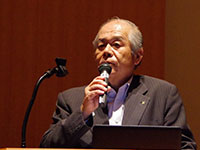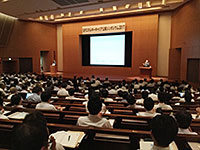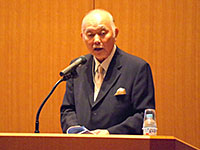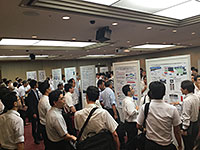SIP Energy Carriers HP:
http://www.jst.go.jp/sip/k04.html
The SIP Public Symposium was jointly held by the Cabinet Office and the Japan Science Technology Agency (JST) at Hitotsubashi Hall, Hitotsubashi University, on July 26, 2017. The program, called “SIP Energy Carriers,” is one of the programs of the Cross-ministerial Strategic Innovation Promotion Program (SIP). The program aims for the promotion of R&D to contribute solving global warming and energy security issues in Japan through the smooth introduction of hydrogen and hydrogen energy carriers.
In his opening remarks, Mr. Ryo Kuroda, Deputy Director General for Science, Technology and Innovation, Cabinet Office, said that the “SIP Energy Carriers” program has been highly evaluated with its concreate outcomes and is expected to lead the implementation in society towards creating a hydrogen-based society.
Next, Program Director, Mr. Shigeru Muraki (Executive Advisor, Tokyo Gas Co, Ltd.), introduced the recent activities of the program. Among the energy carriers subject to R&D at SIP, there has been a significant progress in technology of using ammonia as a fuel directly. Estimated results indicate that direct use of ammonia is promising for hydrogen cost and hydrogen-power generation cost. Mr. Muraki reported that the “Green Ammonia Consortium” was established to strategically examine a foundation of an ammonia value chain in the future. In addition, he noted that the program has vigorously engaged in international activities, such as holding workshops with other nations and presenting lectures at international conferences.
In the key note lecture, entitled “Energy Environment Innovation Strategy towards Super Smart Society,” Prof. Takao Kashiwagi (Professor Emeritus, Tokyo Institute of Technology Institute) lectured on the Japanese energy strategy focused on “National Energy and Environment Strategy for Technological Innovation towards 2050” (NESTI 2050), which was approved by the government on April 19, 2015. Production, transportation, storage, and the use of energy carriers such as hydrogen are regarded as innovative technologies in the energy storage field within NESTI 2050. The roadmap of NESTI2050 will be announced to the public in the near future.
Research directors of 10 R&D themes under the “SIP Energy Carriers” program spoke about their research results and presented posters. As SIP has now been progressing for over three years, the progress of their development is demonstrated by their practical application, such as model demonstration machines, large prototype production, and test driving in real machines.
Finally, Executive Director, Yoshiko Shirokizawa of JST told about JST's continuous promotion of SIP to meet the expectations of everyone, and then closed the symposium.
The “SIP Energy Carriers” will vigorously promote initiatives of “All Japan”, collaboration with the government agencies and among industry, academia and government, and will continue to develop technologies with a view to international collaboration.
- Link to the overview
http://www.jst.go.jp/sip/event/k04/20170726/index.html

PD Muraki spoke about the program.

Presentation by a research director.

The keynote lecture by Prof. Kashiwagi.

Poster Presentations.
JST, an integrated organization of science and technology in Japan, establishes an infrastructure for the entire process from the creation of knowledge to the return to the society. For more information, visit http://www.jst.go.jp/EN/